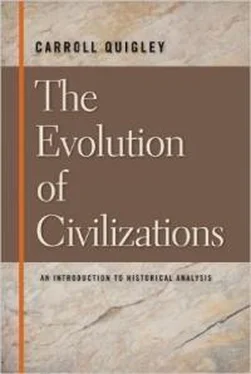When the depression cut attendance in the early 1930s, many games were scheduled in the evening to attract working spectators. For the same purpose the rules were manipulated to give more open play, high scores, and superiority to the offense. By reducing the diameter of the ball, it was made easier to pass and harder to kick, in the belief that spectators preferred passing. Restrictions on passing requiring a minimum distance behind the scrimmage line for the passer or penalizing successive incompleted passes were removed. To keep the ball moving on offense, the referee was instructed to move the ball in fifteen yards from the side lines when it became dead closer than that distance from the sides. At no point in this process did many persons stop to ask themselves, "What is the purpose of football anyway?" But those who look at football's ninety years of development can see quite clearly how an organization which originally rose as an instrument for undergraduate exercise had become something quite different, to the jeopardy of undergraduate exercise.
This process, which we call the institutionalization of instruments, is found in almost all social phenomena. The purpose of music, I suppose, is to provide pleasure from sounds. Various notes are combined together for this purpose and are thus a medium for achieving the purpose of music. But if the same combinations are much used and long continued, they cease to provide pleasure and even cease to be heard. They become "banal." New combinations of sound are devised, usually over the objections of the academician defenders of the older banal combinations who call the innovations "dissonance" or even "discord." But soon the new combinations become accepted, give pleasure, and after much use become banal. They have become institutionalized. Later students, looking back over the development of music, frequently wonder what all the excitement was about. It is difficult for us today to hear the "dissonance" that contemporaries heard in Mozart; we even have some trouble hearing the "discords" with which Stravinsky so shocked the musical world in 1913.
A similar process can be seen in painting, sculpture, architecture, drama, opera, poetry and, indeed, in most human activities. Works that caused riots at their debuts, like Hugo's Hernani or Eliot's Prufrock, leave us cold or only slightly moved. They have reached a condition equivalent to music's banality. Expressions that were vivid, concrete, evocative, and thus "poetical" when first used become "prosaic." The expression "Let us get under weight," which once would recall a full-sail vessel getting under the weight of its anchor and thus off to sea, has now become so lacking in these poetic qualities that editors, proofreaders, and even H. W. Fowler insist on spelling "weigh" as "way."
There is of course nothing particularly original in the statement that organizations begin with devotion to a purpose and somehow along the way get turned from that purpose and gradually become a collection of special interests. The historians of religion frequently point out this process by distinguishing between "religion" and "clericalism." To escape this transformation, the Quakers renounced all organizational features, but it can hardly be said that they have been successful in escaping completely from what seems to be an inevitable process of change. Thorstein Veblen devoted much of his analysis of our economic system to a similar process which he contrasted by such dichotomies as industry versus business, workmanship versus vested interests, or the engineers versus the price system.
The process of which we speak was generalized by Charles Peguy in Notre Jeunesse when he said, “Everything begins as mystique and ends up as politique.” In his own experience he had seen the idealism and broad humanitarian-ism of the original Dreyfusards gradually transformed into the selfish grasping at political power of the Combes ministry. The experience seared his idealistic soul to the point where he welcomed death from German guns in 1914. Fortunately for the survival of mankind most of us are not so sensitive as Peguy, for the institutionalization of social instruments is the most widespread of historical phenomena, and no observant person can fail to notice it. We shall point out many examples of this process in the rest of this volume. When instruments become institutions, as they all do, the organization achieves its function or purpose in society with decreasing effectiveness, and discontent with its performance begins to rise, especially among outsiders. These discontented suggest changes, which they call reforms, just as we see happening in American elementary and secondary education today. When these suggestions are not accepted or are rejected by the established groups who control the criticized organization, conflicts and controversies begin, the discontented seeking to change the organization, while the vested interests seek to maintain their accustomed methods of operation. While all good or all wrong is never entirely on one side in such controversies, discontent and controversy are unlikely to rise to any important level unless the organization is well institutionalized and considerably less effective than the society as a whole expects. Accordingly, when this degree of discontent is reached, the vested-interest groups are generally tending to defend a relatively ineffective system and the "reformers" are, among many mistakes, generally advocating measures that would increase the organization's relative effectiveness in achieving its social purpose.
The strain between the two groups engaged in a struggle such as this will be called, in this book, "the tension of development." From this tension and its ensuing controversy, there may emerge any one (or combination) among three possible outcomes: reform, circumvention, or reaction. In the first case, reform, the institution is reorganized and its methods of action changed so that it becomes, relatively speaking, more of an instrument and achieves its purpose with sufficient facility to reduce tension to a socially acceptable level. In the second case, circumvention, the institution is left with most of its privileges and vested interests intact, but its duties are taken away and assigned to a new instrument within the same society. This second method is much used by the English. The king was left covered with honors, but the task of governing England was taken over by Parliament and ultimately by a committee of Parliament. The Lord Warden of the Cinq Ports has a brilliant uniform and a drafty castle, but the task of guarding the seas of England was given to the Royal Navy in the sixteenth century. The Earl Marshal of England is left with titles and social prestige and still manages the coronation, but the job of leading the army was given to a commander in chief. In the period before the tenth century, when Europe needed defense, an organization called feudalism grew up to provide this need, and performed its task so well that European culture was preserved from the assaults of the Saracens, the pagan Germans, and the eastern raiders. In fact, feudalism performed its task so well that by 1100 Europe was mounting that counterassault that we call the Crusades. But within three hundred years, feudalism had become a vested institution of hereditary privileges and emoluments. It was circumvented by creating in the society a new organization, called the Royal Army, to which the task of defense was given. The privileged vested interests of feudalism were neither reformed nor abolished but were left as a structure of honor and rewards that we call chivalry and the hereditary nobility. In the third possible outcome, reaction, the vested interests triumph in the struggle, and the people of that society are doomed to ineffective achievement of their needs on that level for an indefinite period. The agrarian system of ancient Rome was an inefficient method of producing food even in respect of the existing technical knowledge, but to reform it would have involved abolition of slavery and division of the large estates. The reformers who wanted to do this were assassinated by the daggers of the landlords, some on the floor of the senate itself. As a result, the economic needs of the Roman system could be met only by the use of other levels, especially by military conquest and by political exploitation of conquered provinces. But in time, both the political and the military organizations became ineffective vested institutions. The result was civil war and eventual conquest by outside barbarians.
Читать дальше










